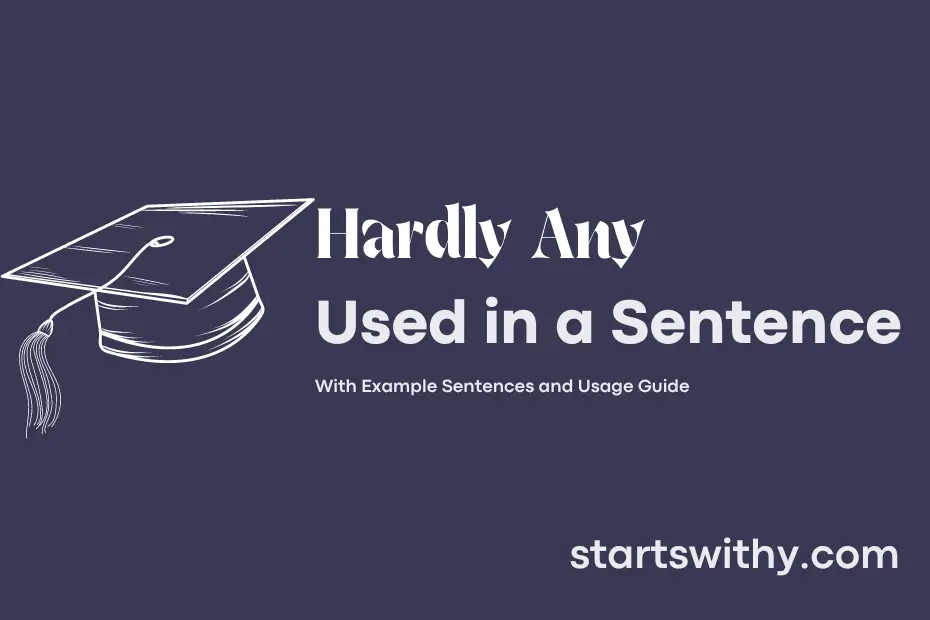Do you struggle with reducing wordiness in your writing? Simplifying your sentences can be a powerful tool to enhance clarity and impact. One effective way to achieve this is by using “hardly any” to convey minimal quantity or degree.
“Hardly any” is a phrase commonly used to indicate a small amount or almost no presence of something. By incorporating this expression into your sentences, you can efficiently communicate the idea of scarcity or limitation, making your writing more concise and direct. Let’s explore how to effectively integrate “hardly any” into your sentences for maximum impact.
7 Examples Of Hardly Any Used In a Sentence For Kids
- I have hardly any toys to play with.
- There are hardly any clouds in the sky today.
- I had hardly any sleep last night.
- There is hardly any milk left in the fridge.
- I can see hardly any birds in the garden.
- There are hardly any apples in the basket.
- I have hardly any candies left to share.
14 Sentences with Hardly Any Examples
- Hardly any students attended the lecture on a Saturday morning.
- I have hardly any time left to prepare for my exams.
- She had hardly any resources to complete her project on time.
- Hardly any of the students were able to solve the difficult math problem.
- He had hardly any money left after paying his college fees.
- There was hardly any space left in the library during exam week.
- I have hardly any knowledge of the subject being discussed in class.
- She had hardly any sleep the night before the big presentation.
- Hardly any of the books required for the course were available in the college library.
- He had hardly any food in his hostel room during the lockdown.
- I have hardly any interest in attending the boring college event.
- There were hardly any parking spots available near the college entrance.
- Hardly any students were participating in the college sports tournament.
- She had hardly any motivation left to study for her final exams.
How To Use Hardly Any in Sentences?
To use Hardly Any in a sentence, you can follow these simple steps:
-
Identify the Context: First, determine the situation where you want to use “Hardly Any.” This phrase is commonly used when referring to a small amount or quantity of something.
-
Choose Your Words: Decide what you want to communicate about the limited amount. It could be Hardly Any time, Hardly Any money, or Hardly Any people, for example.
-
Sentence Structure: Construct a sentence using the phrase Hardly Any to convey the idea of scarcity. For instance, “There was Hardly Any time left to finish the project,” or “She had Hardly Any money in her wallet.”
-
Practice and Use: Once you have formulated your sentence, say it out loud to ensure it flows well and conveys the intended message. You can practice using Hardly Any in different sentences to become more comfortable with its usage.
-
Check for Clarity: Make sure that your sentence clearly communicates the idea of a minimal or insufficient amount using the phrase Hardly Any.
Overall, using Hardly Any in a sentence is a straightforward way to express scarcity or a lack of something. With a little practice, you can effectively incorporate this phrase into your everyday communication to convey the idea of very little of something.
Conclusion
In summary, sentences with hardly any serve to emphasize the scarcity or absence of something. They are succinct and straightforward, often used to highlight a lack of quantity or degree. By using this phrase, writers can underscore the minimal presence or impact of a particular element in a concise manner.
Whether describing the amount of time left to complete a task, the resources available for a project, or the chances of success in a situation, sentences with hardly any efficiently communicate a sense of limitation or insufficiency. Their simple yet impactful structure helps convey a clear message to the reader, making them a valuable tool for expressing scarcity or constraint in a wide range of contexts.



